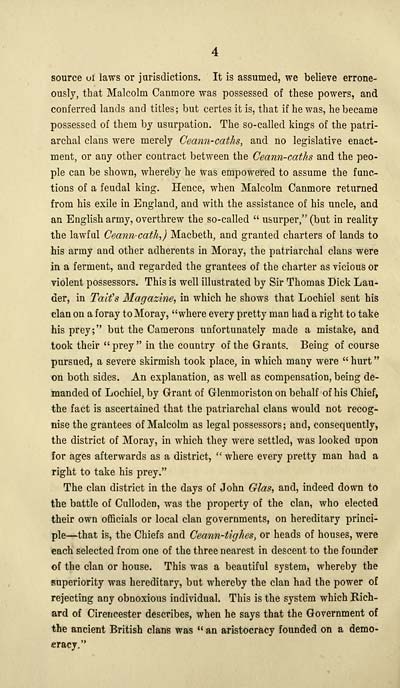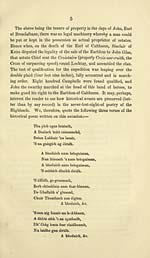Statement of the Breadalbane case
(10) Page 4
Download files
Complete book:
Individual page:
Thumbnail gallery: Grid view | List view

source ui laws or jurisdictions. It is assumed, we believe errone-
ously, that Malcolm Canmore was possessed of these powers, and
conferred lands and titles; but certes it is, that if he was, he became
possessed of them by usurpation. The so-called kings of the patri-
archal clans were merely Ceann-caths, and no legislative enact-
ment, or any other contract between the Ceann-caths and the peo-
ple can be shown, whereby he was empowered to assume the func-
tions of a feudal king. Hence, when Malcolm Canmore returned
from his exile in England, and with the assistance of his uncle, and
an English army, overthrew the so-called " usurper," (but in reality
the lawful Ceann-cath,) Macbeth, and granted charters of lands to
his army and other adherents in Moray, the patriarchal clans were
in a ferment, and regarded the grantees of the charter as vicious or
violent possessors. This is well illustrated by Sir Thomas Dick Lau-
der, in Tait's Magazine, in which he shows that Lochiel sent his
clan on a foray to Moray, "where every pretty man had a right to take
his prey;" but the Camerons unfortunately made a mistake, and
took their "prey" in the country of the Grants. Being of course
pursued, a severe skirmish took place, in which many were " hurt "
on both sides. An explanation, as well as compensation, being de-
manded of Lochiel, by Grant of Glenmoriston on behalf of his Chief,
the fact is ascertained that the patriarchal clans would not recog-
nise the grantees of Malcolm as legal possessors; and, consequently,
the district of Moray, in which they were settled, was looked upon
for ages afterwards as a district, " where every pretty man had a
right to take his prey."
The clan district in the days of John Glas, and, indeed down to
the battle of Culloden, was the property of the clan, who elected
their own officials or local clan governments, on hereditary princi-
ple — that is, the Chiefs and Ceann-tighes, or heads of houses, were
each selected from one of the three nearest in descent to the founder
of the clan or house. This was a beautiful system, whereby the
superiority was hereditary, but whereby the clan had the power of
rejecting any obnoxious individual. This is the system which Rich-
ard of Cirencester describes, when he says that the Government of
the ancient British clans was " an aristocracy founded on a demo-
cracy. "
ously, that Malcolm Canmore was possessed of these powers, and
conferred lands and titles; but certes it is, that if he was, he became
possessed of them by usurpation. The so-called kings of the patri-
archal clans were merely Ceann-caths, and no legislative enact-
ment, or any other contract between the Ceann-caths and the peo-
ple can be shown, whereby he was empowered to assume the func-
tions of a feudal king. Hence, when Malcolm Canmore returned
from his exile in England, and with the assistance of his uncle, and
an English army, overthrew the so-called " usurper," (but in reality
the lawful Ceann-cath,) Macbeth, and granted charters of lands to
his army and other adherents in Moray, the patriarchal clans were
in a ferment, and regarded the grantees of the charter as vicious or
violent possessors. This is well illustrated by Sir Thomas Dick Lau-
der, in Tait's Magazine, in which he shows that Lochiel sent his
clan on a foray to Moray, "where every pretty man had a right to take
his prey;" but the Camerons unfortunately made a mistake, and
took their "prey" in the country of the Grants. Being of course
pursued, a severe skirmish took place, in which many were " hurt "
on both sides. An explanation, as well as compensation, being de-
manded of Lochiel, by Grant of Glenmoriston on behalf of his Chief,
the fact is ascertained that the patriarchal clans would not recog-
nise the grantees of Malcolm as legal possessors; and, consequently,
the district of Moray, in which they were settled, was looked upon
for ages afterwards as a district, " where every pretty man had a
right to take his prey."
The clan district in the days of John Glas, and, indeed down to
the battle of Culloden, was the property of the clan, who elected
their own officials or local clan governments, on hereditary princi-
ple — that is, the Chiefs and Ceann-tighes, or heads of houses, were
each selected from one of the three nearest in descent to the founder
of the clan or house. This was a beautiful system, whereby the
superiority was hereditary, but whereby the clan had the power of
rejecting any obnoxious individual. This is the system which Rich-
ard of Cirencester describes, when he says that the Government of
the ancient British clans was " an aristocracy founded on a demo-
cracy. "
Set display mode to:
![]() Universal Viewer |
Universal Viewer | ![]() Mirador |
Large image | Transcription
Mirador |
Large image | Transcription
Images and transcriptions on this page, including medium image downloads, may be used under the Creative Commons Attribution 4.0 International Licence unless otherwise stated. ![]()
| Histories of Scottish families > Statement of the Breadalbane case > (10) Page 4 |
|---|
| Permanent URL | https://digital.nls.uk/94764487 |
|---|
| Description | A selection of almost 400 printed items relating to the history of Scottish families, mostly dating from the 19th and early 20th centuries. Includes memoirs, genealogies and clan histories, with a few produced by emigrant families. The earliest family history goes back to AD 916. |
|---|
![[Page 3]Preface](https://deriv.nls.uk/dcn4/9476/94764477.4.jpg)
